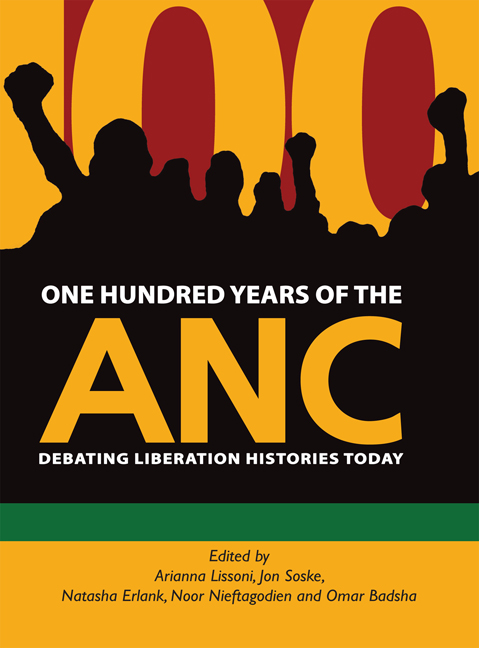Book contents
- Frontmatter
- Contents
- Acknowledgements
- Editorial Note
- FIRST KEYNOTE ADDRESS: Fragmentation and Cohesion in the ANC: The First 70 Years
- SECOND KEYNOTE ADDRESS: A Continuing Search for Identity: Carrying the Burden of History
- Chapter One One Hundred Years of the ANC: Debating Struggle History After Apartheid
- Chapter Two Religion And Resistance In Natal, 1900–1910
- Chapter Three Christianity and African Nationalism in South Africa in the First Half of the Twentieth Century
- Chapter Four Charlotte Maxeke: A Celebrated and Neglected Figure in History
- Chapter Five Imagining the Patriotic Worker: The Idea of ‘Decent Work’ in the ANC's Political Discourse
- Chapter Six Popular Movements, Contentious Spaces and the ANC, 1943–1956
- Chapter Seven Unravelling the 1947 ‘Doctors’ Pact’: Race, Metonymy and the Evasions of Nationalist History
- Chapter Eight The Politics of Language and Chief Albert Luthuli's funeral, 30 July 1967
- Chapter Nine Robben Island University Revisited
- Chapter Ten Shishita: A Crisis in the ANC in Exile in Zambia, 1980–811
- Chapter Eleven Comrade Mzwai
- Chapter Twelve Revisiting Sekhukhuneland: Trajectories of Former UDF Activists in Post-Apartheid South Africa
- Chapter Thirteen Regeneration of ANC Political Power, from the 1994 Electoral Victory to the 2012 Centenary
- Chapter Fourteen The ANC: Party Vanguard of the Black Middle Class?
- Chapter Fifteen Globalisation, Recolonisation and the Paradox of Liberation in Southern Africa
- Contributors
- Index
Chapter Nine - Robben Island University Revisited
Published online by Cambridge University Press: 21 April 2018
- Frontmatter
- Contents
- Acknowledgements
- Editorial Note
- FIRST KEYNOTE ADDRESS: Fragmentation and Cohesion in the ANC: The First 70 Years
- SECOND KEYNOTE ADDRESS: A Continuing Search for Identity: Carrying the Burden of History
- Chapter One One Hundred Years of the ANC: Debating Struggle History After Apartheid
- Chapter Two Religion And Resistance In Natal, 1900–1910
- Chapter Three Christianity and African Nationalism in South Africa in the First Half of the Twentieth Century
- Chapter Four Charlotte Maxeke: A Celebrated and Neglected Figure in History
- Chapter Five Imagining the Patriotic Worker: The Idea of ‘Decent Work’ in the ANC's Political Discourse
- Chapter Six Popular Movements, Contentious Spaces and the ANC, 1943–1956
- Chapter Seven Unravelling the 1947 ‘Doctors’ Pact’: Race, Metonymy and the Evasions of Nationalist History
- Chapter Eight The Politics of Language and Chief Albert Luthuli's funeral, 30 July 1967
- Chapter Nine Robben Island University Revisited
- Chapter Ten Shishita: A Crisis in the ANC in Exile in Zambia, 1980–811
- Chapter Eleven Comrade Mzwai
- Chapter Twelve Revisiting Sekhukhuneland: Trajectories of Former UDF Activists in Post-Apartheid South Africa
- Chapter Thirteen Regeneration of ANC Political Power, from the 1994 Electoral Victory to the 2012 Centenary
- Chapter Fourteen The ANC: Party Vanguard of the Black Middle Class?
- Chapter Fifteen Globalisation, Recolonisation and the Paradox of Liberation in Southern Africa
- Contributors
- Index
Summary
INTRODUCTION
From the early 1960s to the middle of the 1980s, Robben Island (a small island in Table Bay, Cape Town) became South Africa's major site for the incarceration of black political prisoners. Holding the country's most visible public figures, people such as Nelson Mandela, Walter Sisulu, Govan Mbeki and Robert Sobukwe, the prison rightly became a place of national and international significance. Central to this significance is what it came to stand for: oppression, cruelty and inhumanity, on the one hand, and stoic resistance and nobility of spirit, on the other. In the South African discourse on transformation, the prison is one of the country's most important symbols of redemption and reconciliation. But it is also important, counter-intuitively so, as a place of learning.
When many South African universities in the 1970s and 1980s were grappling with the reality of their complicity with the apartheid regime, and so struggling with what they were teaching and researching, Robben Island became one of the foremost sites of intellectual vitality in the country. Against the grain of all the conditions on the Island – its dehumanising rules and regulations, its deployment of a largely sadistic corps of white supremacist prison overseers, its proclivity for breeding inter-party strife – the prisoners rapidly evolved distinctive methods of teaching and learning and broke new ground in terms of the country's dominant historiographic traditions. Pedagogically, the prisoners developed models of teaching and learning which opened up the question of how one could do both in adverse conditions. Historiographically, the prison generated lines of scholarly argument in the 1960s that, within the limitations of prison life, presaged and anticipated the critique of Eurocentricism and the interrogation of Africa's representation in dominant historical writing that was to emerge in the South African academy only a decade later with the work of scholars such as Martin Legassick and Harold Wolpe.
Both of these developments – how one might learn in circumstances of extreme difficulty and the restoration of a dignified Africa in a historical accounting – were deeply important. That they have not been sufficiently recognised in the country's post-apartheid policy programme is problematic. The value they represent is precisely that they engaged actively with the divisive and destructive legacies of colonialism and apartheid as well as with the need to develop new educational practices and intellectual traditions.
- Type
- Chapter
- Information
- One Hundred Years of the ANCDebating Liberation Histories Today, pp. 211 - 232Publisher: Wits University PressPrint publication year: 2012



